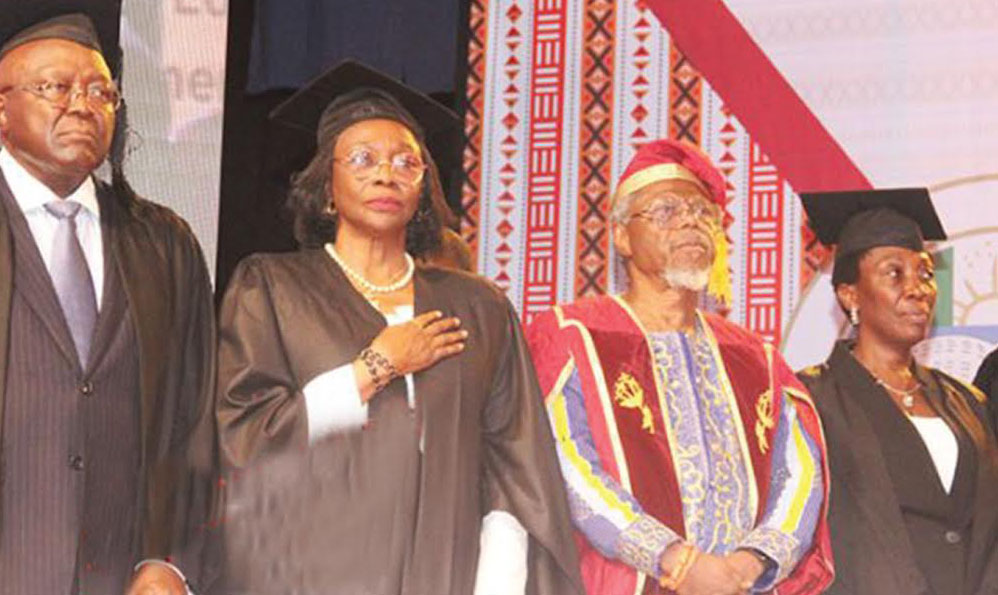
Foremost Historian and Professor of African Studies, University of Texas, Austin, United States, Toyin Falola, has tasked African institutions to refocus conversations around teaching and research related to the region.
Falola, while delivering the 54th convocation lecture of the University of Lagos (UNILAG), said African scholars must wean themselves of ‘western/colonial influence, especially when teaching and conducting researches relating to the region and its people’.
The event was chaired by the former Pro-Chancellor and Chairman of Council, Obafemi Awolowo University (OAU), Ile-Ife, Dr Yemi Ogunbiyi.
In his lecture titled, ‘Decolonising African higher education for transformational development’, Falola noted that indigenous knowledge systems have distinct and essential roles to play in the curriculum.
According to him, their integration into educational programmes enhances inclusivity of the curriculum. and mitigates the sense of alienation experienced by diverse minority students in African institutions of higher learning.
He said rather than simply dismissing indigenous practices and beliefs, such as those related to natural phenomena like medicine and politics, instructors at all levels should consider involving students in scientific investigations aimed at comprehending or disproving the underlying these taboos.
The eminent scholar noted that a successful approach must promote critics’ thinking and bridge the gap between traditional wisdom and scientific understanding.
This, he stated, encourages students to engage actively with their cultural heritage, while also developing their scientific inquiry abilities.
Falola emphasised the need for African teachers to take on the role of champions for the interpretation of indigenous knowledge and wisdom; work to upgrade and enrich these traditional bodies of knowledge through research and scholarly engagement.
By so doing, the eminent historian noted that education in Africa can be a bridge between the past and future, nurturing a generation of well-rounded, culturally connected and scientifically literate individuals.
For instance, he said while African scholars have made substantial contributions to the discourse on politics, offering informative perspectives that were culturally inclusive over the years, the field of political studies within the African higher education system still favour the political theories of western scholars.
Falola argued that sometimes, this development disregards the conscious efforts of African political actors and scholars, noting that this inclination often sidelines the significance of tailoring political thought to the African context and terrain.
Given these considerations therefore, the university teacher pointed out that the best teaching method for African higher institutions should be a balanced and inclusive approach, which should involve the incorporation of both the western and indigenous knowledge systems, providing students with a comprehensive education that is deeply rooted in their own cultural and historical context, while also drawing from the wealth of global knowledge,” he stated.
He noted that a way forward was to demand for the concept and research of these higher institutions to reflect African scholarship.
Falola also urged the National Universities Commission (NUC) to stop imposing “neoliberal and western agenda” on the nation’s university system.
He, however, lamented the challenges confronting university education in Nigeria, noting that Nigeria’s tertiary institutions lack full autonomy, hence, do not have the required independence to achieve the decolonisation that is so much desired.
Falola faulted the roles of regulatory agencies in the sector, saying the NUC, for instance, should be concerned with the decolonisation of education in Nigeria, rather than advancing neoliberal standards.
He noted that Africa’s curriculum often undergoes amendments to align with global standards and that over time, the cultural imperatives that contribute to the identity of the people are gradually removed from the curriculum.
“Interestingly, internal deficiencies in the African system of education hinder the decolonisation of the curriculum. Many libraries in African universities shelve mostly Western books, creating unavailability challenges for researchers seeking African resources,” he said.
While highlighting steps for the overall enhancement of decolonisation in UNILAG and African higher education for transformational development, the historian suggested the expansion of general courses and programmes on cultural properties.
He also recommended the promotion of African languages as academic courses, the creation of African vocabulary development and enlightenment bank; the proliferation of African concepts and scholarship; social cultural initiatives; and combined honour awards in African culture, science and economies.
Falola further proposed the creation of a centre for creative economies, explaining that UNILAG being in Lagos, Africa’s largest coastal city requires an academic discipline with a focus on “blue economy.”
“Education at the University of Lagos must involve research and understudies that explore subjects and concepts that will foster the country’s infrastructure and economic development,” he added, recommending the creation of the Department of Lagoon and Sea Economies.
In her welcome remarks, the Vice Chancellor, Prof. Folasade Ogunsola, lamented that the current educational system modelled on colonial constructs has not been able to drive the all-round development in the region.
She emphasised that as Africans, we must embrace who we are to enable us to make the right choices on what parts of other cultures to adopt.
“We must rediscover our purpose, trace our heritage, re-orientate our minds and develop new policies that embrace our peculiarities and unique flavour,” Ogunsola said.






